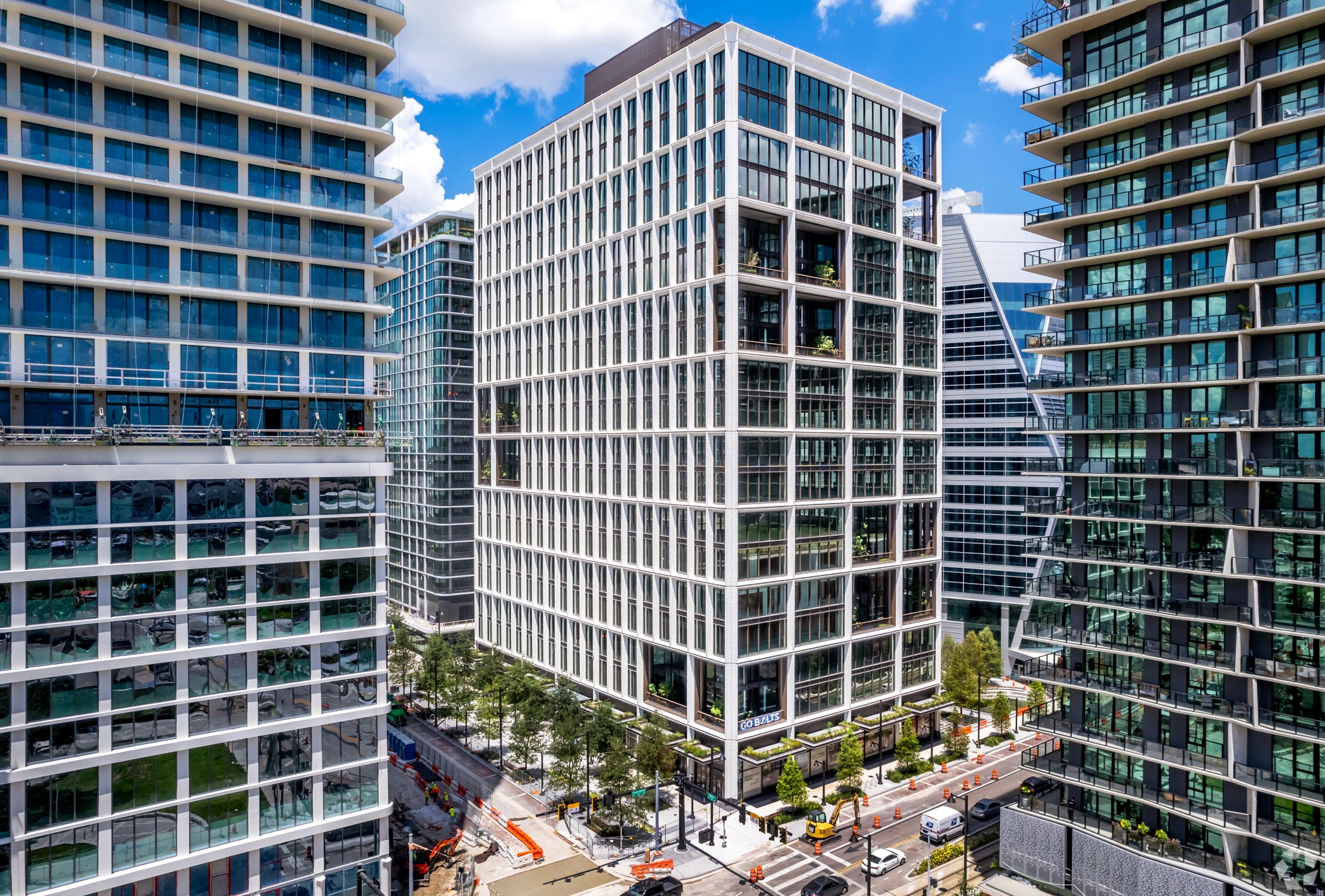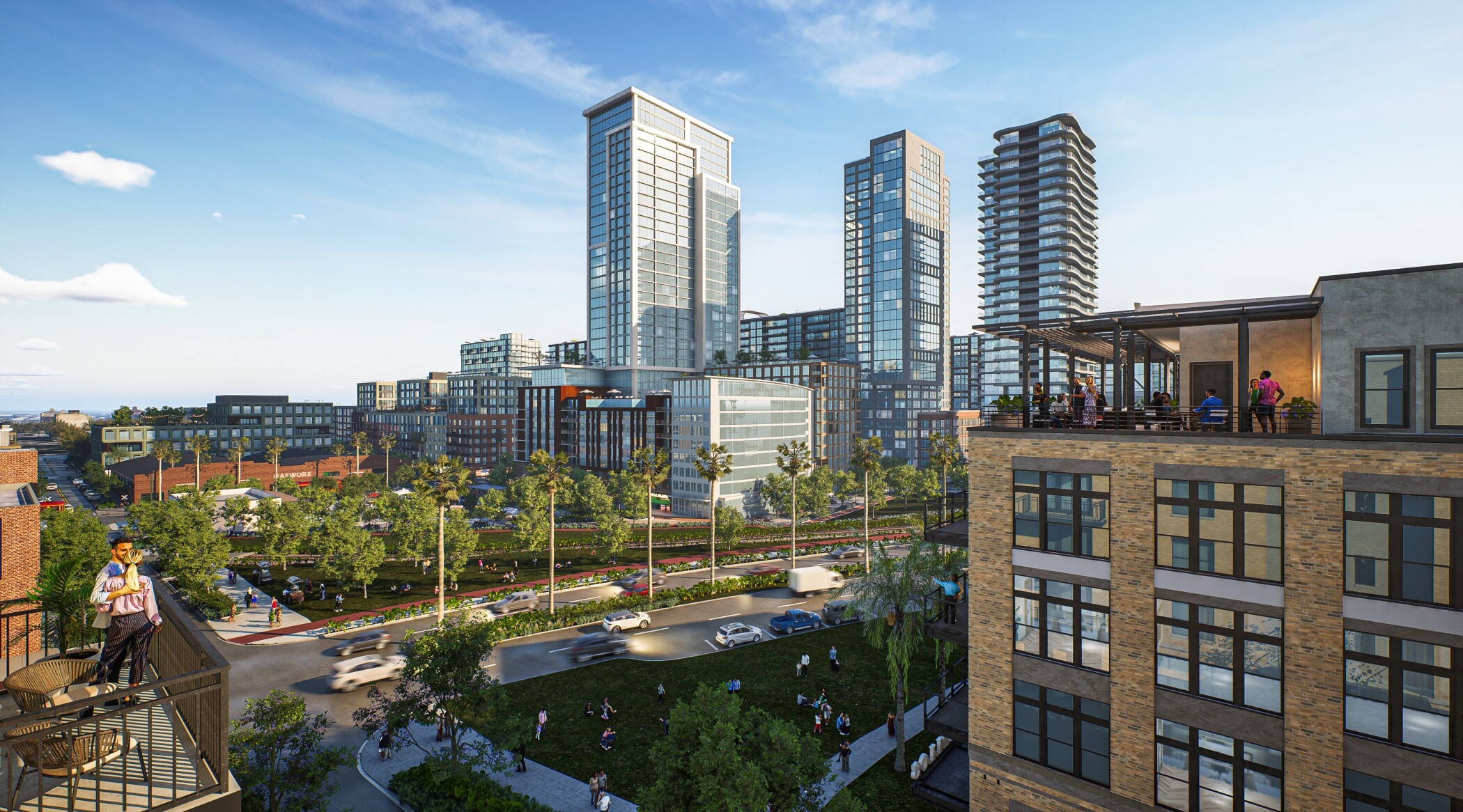The screech of steel on steel is loud as the trolley coming to a halt in the center of downtown Tampa, Florida, serves as a stout yellow reminder of the city’s storied history and its nascent future.
The path of the TECO Streetcar system traces the city's development and marks its latest evolution. It connects the city's downtown with a collection of new and historic neighborhoods crucial to Tampa's growth.
To travel through these changes, hop aboard the trolley at downtown’s Hattricks Station. The heritage line, which evokes the original 19th-century system and maintains one of the original Birney trolley cars in its fleet, extends about 2.7 miles east toward the historic cigar district known as Ybor City.
Along the route, riders pass multibillion-dollar projects taking shape, as developers like Strategic Property Partners, a subsidiary of billionaire Bill Gates’ Cascade Investment, Casa Ybor, led by longtime Tampa booster Darryl Shaw, and Kettler aim to capitalize on Tampa’s economic growth and swelling population as residents move in from across the country and pricier parts of Florida.
“Our skyline is different,” said Craig Richard, CEO of the Tampa Bay Economic Development Council, in an interview with CoStar News. “A lot of people are moving from Miami to Tampa. That's one of the top origins of migration within the state.”
The Tampa-St. Petersburg area ranked No. 4 on the Urban Land Institute's 2025 report of the most promising markets for property and investor demand with double-digit gains, making it the most improved spot among Florida's major metropolitan areas on the annual rankings.
The report touted the city’s share of private office-using jobs, 39 percentage points higher than the national average, as well as its high concentration of jobs in the financial services sector. Tampa has more than 5,000 finance jobs from just four companies, but still ranks in the top five for the nation's most economically diverse metropolitan areas, the report said.
“Local economic growth is expected to be conducive to outsized real estate returns. Continued in-migration, an attractive business climate, and job growth forecast at 2.3 times the nation’s five-year forecast set the stage for continued demand for Tampa real estate,” the institute said about Tampa in the report.
Although major developments marrying residential and commercial components like Water Street Tampa and Gasworx are helping to bring more residents to downtown, there’s a wider recognition on the part of stakeholders that issues like traffic and the cost of living have to be proactively managed to avoid repeating the mistakes some other Florida cities have made.
Policymakers “understand the thing that can hinder our growth is not paying attention to basics of urban and regional development,” Richard said.
Water Street Tampa

To see the potential, let's jump back on the streetcar. The yellow trolley hums through the city, heading south underneath the Selmon Expressway. Built in the 1970s and upgraded and expanded in 2020, the highway arcs over the city streets toward St. Petersburg, and severs downtown Tampa’s office towers from the waterfront less than a mile south.
The trolley horn echoes under the overpass, fading as the Tampa Convention Center and Amalie Arena, home of the NHL's Tampa Bay Lightning, appear. Hugging the waterfront is the 5.4-acre Cotanchobee Fort Brooke Park, combining the original Seminole word for the area, “where the big water meets the land,” with the name of the 1824 post established by the U.S. Army. Even in the 90-degree heat, joggers and dog walkers are out in force, making the most of Florida’s abundant sunshine.
A swing north and then east again to Amalie Arena Station reveals a collection of glass-and-steel towers known as Water Street Tampa, a $3.5 billion mixed-use development that represents some of the densification of Tampa’s city center with apartments, offices and shops all within walking distance of each other. The 56-acre project is the largest commercial development underway in Tampa.
The first phase of Water Street Tampa was completed in 2023 and includes an office tower, hotels and three multifamily towers on what was once a collection of undeveloped land and surface lots that had sat underutilized in the wake of Tampa’s urban renewal in the 1950s, 1960s and 1970s.

The initial phase included Thousand and One, the first trophy office tower to break ground in Tampa’s downtown in three decades, marking "the beginning of a new chapter for workplaces," Tampa-based developer Strategic Property Partners said on its website. The 375,000-square-foot office tower has lured a number of relocating firms such as Toorak Capital Partners, a mortgage investor originally from New Jersey, and a satellite location — currently subleased to South Florida’s Shubin Law Group — from the $65 billion hedge fund Citadel that moved its headquarters to Miami from Chicago in 2022.
Water Street Tampa was designed with factors like walkability and community health in mind, with wide sidewalks, shade trees and water stations, and in 2023 was the first neighborhood in North America to receive the gold-level WELL Community Certification, which recognizes projects that promote the health and well-being of residents.
The trolley line passes within sight of apartment complexes at Water Street Tampa such as Cora, Heron and Asher, which command some of the highest rents in the city, and the Tampa Edition, the city’s first five-star hotel.
An outdoor food hall, Sparkman Wharf, spotlights businesses and new food and beverage concepts from local entrepreneurs, while boutique shops and restaurants — a French boulangerie here, a homemade ice cream shop there — line the rest of Water Street Tampa’s wide, shaded sidewalks.

Strategic Property Partners and other developers are working on Phase 2 of Water Street Tampa, which is expected to be complete in 2027. Plans, filed in July, call for a 1-acre park, a mixed-use building with 38,000 square feet of retail, 675 parking spaces and a “signature rooftop area,” according to a statement.
The additions “reflect our focus on meeting the infrastructure needs of a growing neighborhood, while enhancing the daily experience for residents, workers, and visitors alike,” said Josh Taube, CEO of Strategic Property Partners, when plans for the next phase was announced.
The trolley picks up speed after swinging north one final time as it passes through the Channelside district and the Port of Tampa.
The yellow trolley dips underneath the expressway once more, emerging to a collection of squat brick warehouses, shops and apartments, some over 100 years old. The streetcar slows as it turns east into Ybor City, and a metal footbridge emblazoned with the words "Centro Ybor" welcomes visitors to the neighborhood as this trolley reaches the end of the line.
Ybor City & Gasworx

A walk of several blocks brings visitors to a destination founded in 1886 by Vicente Martinez Ybor as a company town. Ybor City became known as the cigar capital of the world by 1900, and by the 1920s the area was home to over 200 cigar factories and thousands of workers producing what were considered among the finest cigars in the world.
The cigar industry collapsed following the Cuban revolution, and urban renewal projects leveled large swaths of the neighborhood in the 1950s and 1960s. But now, Casa Ybor CEO Shaw and joint venture partner Kettler, based in Washington, D.C., are building Gasworx, a 50-acre mixed-use development that aims to breathe new life into Ybor City. The development's first phase is under construction and calls for 1,250 residential units, about 100,000 square feet of office space and 105,000 square feet of retail and commercial space intended by Design Collective to evoke the neighborhood's history.

“We don't want to create Gasworx as a completely newly defined place ... we want it to blend in,” said Graham Tyrrell, a senior vice president at Kettler who moved to Tampa in 2020 to jump-start Gasworx, in an interview with CoStar News.
Eventually, Gasworx is expected to total 6 million square feet of mixed-use development, with Shaw and Kettler aiming to wrap up construction on the first phase in 2026 and the second by 2027.
Aspects of the project pay homage to the neighborhood’s history, with apartments like La Union, which opened in late 2024 on the site of one of the city’s old Afro-Cuban clubs, La Union Marti Maceo. A 390-unit apartment project under construction, the Stevedore, takes its name from the Port of Tampa’s original dockworkers.
In some cases, Gasworx is converting existing structures into new commercial space. At 1301 E. Fourth Ave., the development team is turning a 28,000-square-foot, 1950s-era warehouse into a market and community hub for shops and vendors.
Tyrrell said that a number of retailers, many of them independent shops from around Tampa Bay, are already vying for space in the new market. “The buzz is out that if you’re a cool independent retailer in Tampa Bay, you need to be paying attention” to Gasworx, Tyrrell said.
And while the Selmon Expressway still separates the area from the Channelside District where Water Street Tampa is rising, the Gasworx team is developing a streetcar station with plans to keep building farther south toward the highway to connect the two neighborhoods.

Tyrrell said a number of the buildings in the heart of Gasworx and closest to Ybor City would be mid- and low-rise structures, with taller buildings farther south as development approaches the highway. Buildings “on the very southern edge can go up to as high as 30 stories. Those are going to be true high-rise buildings in the future. It's really filling up the area all the way to the freeway,” Tyrrell said.
While years remain before the completion of Gasworx, major businesses have already given the development their vote of confidence. Locally based Grow Financial, for example, is expected to take up the third and fourth floors of a 115,000-square-foot, six-story office building under construction after the credit union signed a lease for 50,000 square feet of space in 2023.
Grow Financial's "CEO really wanted to be in the city center, particularly for future recruiting," Tyrrell said. The CEO said that even though Grow Financial is a financial company, most of its employees are tech people. "They want to be in the cool part of town,'" Tyrrell said.
